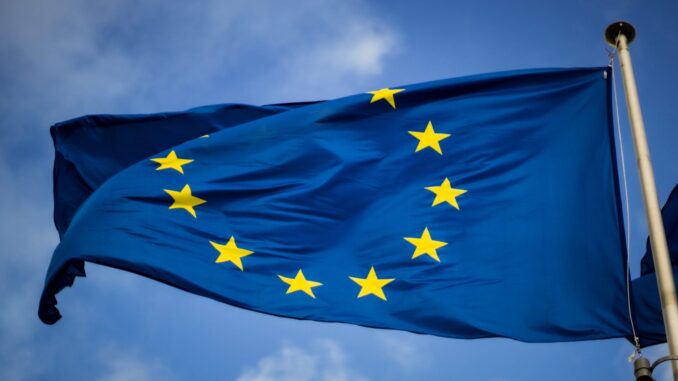
VIENNA — Europe lost the first round of the digital revolution to China and the U.S. and needs to take decisive action to fix its digital single market, according to European Commission Executive Vice President Margrethe Vestager, who heads the bloc’s digital strategy.
“The timing to solve this problem is absolutely now, because we are now at the beginning of the next phase of digitalization,” Vestager stressed in an exclusive interview with Zenger News.
She added Europe must better accommodate the growth of tech firms to capitalize on the next big wave of global digitalization in the coming years.
The 27-member strong European Union has a highly industrialized and diversified economy, which is the world’s second-largest after the U.S., measured by joint gross domestic product. However, when it comes to industry-leading technology firms it is trailing behind the U.S. and China.
With the UK’s EU-exit finalized at the beginning of this year, the picture looks darker. Of the 603 currently listed high-growth “unicorn” tech firms, defined as high-growth companies with a market valuation in excess of $1 billion, only 41 are currently based in the European Union, compared to 298 in the U.S. and 140 in China, according to research firm CB Insights.
This shortage is a clear indication that Europe has not had the functioning digital single market and investment capital needed to truly accommodate large-scale and sector-defining successes in the global digital marketplace, according to Dhiraj Mukherjee, a London-based angel investor and co-founder of Shazam, which was acquired by Apple for $400 million in 2017.
A Strong Ecosystem is Key
One major challenge Europe faces, Mukherjee told Zenger, is the EU comprises national markets, rather than a single market, due to differences in language and regulations. He added that Europe has been less successful at cultivating tech clusters where start-ups, mature firms and equity investors thrive side by side and inspire each other.
“To succeed at turning your company into a unicorn, you need role models, and you need the support of equity investors — you need an ecosystem. Europe hasn’t had much of an ecosystem to support the growth of a large number of tech companies,” Mukherjee said.

The European tech and investment environment has, however, changed a great deal since he co-founded Shazam in 1999.
“In the past few years I have virtually seen local ecosystems developing before my eyes,” he said, adding that for such ecosystems to foster big tech companies is a long-term play.
“If you look forward 20 to 25 years the situation may well look very different from today,” Mukherjee said. “It takes a long time to create the conditions and the ecosystems and develop the unicorns. There’s a very long horizon, and even then the U.S has some advantages in terms of the big market, the common language, the history and the investment-willing capital,” he said.
However, according to Vestager, Europe cannot afford to wait that long.
No Time to Waste
Of the 100 largest global tech firms, only two are currently European — German enterprise applications manufacturer SAP and Dutch semiconductor firm ASML. The EU’s apparent difficulty in developing and maintaining large tech firms on European soil is an issue that needs urgent fixing, Vestager said.
“It’s difficult to lay down a specific time horizon, but the next ten years will be decisive, absolutely decisive, and maybe even more so since things are speeding up. It will not be the same as the first really big chapter of digitalization — the past ten years that gave us Google, Facebook, Apple, the tech giants as we see them today,” she said.
“Obviously, Europe should be fertile ground for businesses to scale up,” she said, adding that Europe should not try to play catch-up, but use its existing strengths to conquer a dominant stake in the new digital economy as it is emerging.
“It is important that our ambition is not to copy. It’s perfectly fine with one Facebook. I don’t think we need a European version of the same. What we need is that in this next amazing chapter of digitalization where public sector services will digitalize, where industry will digitalize, where agriculture will digitalize, that here we also see European businesses scaling up,” Vestager said.
Venture Capital and Private Equity Needed to Go Big
No major tech companies have yet laid claim to dominant platforms within these sectors as it happened a decade ago with companies such as Amazon and Google. Vestager would like to see Europe occupy these open spots.
“This is our ambition, because here I think Europe has a much stronger position than we had ten years ago. We have an industrial culture, we have a tradition of entrepreneurship, and we have a very strong culture of innovation as well,” she said.
“If you look at the shopping sprees that Google and a number of other big tech companies have had in Europe, you see that they see the potential of European innovators and startups, so we have the promising assets in order to make it happen. What we have to do of course is to work on the barriers,” she said.
According to a February report authored by Copenhagen Economics for the European Commission, there is a huge equity gap in Europe compared to the U.S.
The Study on Equity Investments in Europe: Mind the Gap report said in the non-listed capital market, which include angel investors, venture capital and private equity, European companies have access to merely a quarter of the equity investment capital that U.S. companies have when adjusted for gross domestic product. The study concluded that the lack of funding for seed and start-up companies means fewer companies survive to the later stages in the business life cycle and thereby meet their growth potential.
However, the study also found that even if they make it that far, the venture capital and private equity capital funds available to later-stage European firms are around three times smaller than in the U.S. Even more alarmingly, the funding deficit not only hampers growth, but also sends mid-sized companies into the arms of foreign-based investors, leading them to migrate in order to secure funds for the final growth push.
“This definitely has to be changed,” said Vestager. “It has to change, because it is needed.”
Vestager added to this assessment that venture capital also comes with a different level of engagement and growth competencies than what EU funding or a bank can offer.
The Importance of Thinking About the End Game
Danish-born IT-entrepreneur Morten Middelfart can testify to the value of risk-willing private venture capital. He left a position as chief technology officer with Denmark-based enterprise solutions firm Targit in 2014 to start his own company and is now chief data scientist and co-founder of Florida-based artificial intelligence solutions start-up Lumina Analytics, which was recognized as one of the world’s top 100 most intriguing entrepreneurial businesses in 2020 by Goldman Sachs. Having helped build up Targit for 17 years, he knew his next destination had to be the U.S., he told Zenger News, due mainly to what he described as a marked difference in mindsets.
He likens this difference to a story of two Roman stone masons toiling away with hammers and chisels when the emperor passes by and asks what they are doing — one says he’s making a square block, the other says: “I’m building a bridge”.
“The key question is: What is the end-game? That was the reason I left Denmark and Targit. Targit’s ambition was to make money, never to be the world’s most successful in our field and beat Microsoft. ,” Middelfart said.
“The financial commitment is colossal if you want to create a unicorn. It’s a completely different degree of risk-willingness and commitment than what you traditionally see in Europe,” he said.
Middelfart managed to secure $1 million in start-up capital for his first American solo project, Social Quant, largely by coincidence when his bank put in him in connection with a man named Allan Martin, who had made a fortune in mortgage consolidation services and was looking to invest some of it. .
“After a while he told me he didn’t invest the $1 million because he expected a return, but because he was interested in AI and wanted to work with me.”
“He told me: ‘I would like to found a company with bigger ambitions. I will be the CEO and bring the money’,” said Middelfart.

That was the start of Lumina Analytics, which analyzes corporate risks with the help of AI and big data. Middelfart said Lumina Analytics considered establishing European presence, but came to the conclusion that since the continent cannot be treated as one single market, “the steak wasn’t juicy enough to justify the trouble.”
“It’s not that Europe doesn’t offer opportunities, but there are simply some key conditions that are currently better in the U.S. In my specialized field you have already lost 20 percent if your company isn’t registered in the U.S. That is my impression. You don’t get any bonus points if your business card says Europe,” Middelfart said.
Staying Focused on a Brighter Future
Vestager is more upbeat about Europe’s competitiveness and digital economy prospects, and it is exactly in Middelfart’s field of expertise, artificial intelligence and big data, that she expects Europe to break the unicorn curse in coming years.
“Artificial intelligence and this kind of learning algorithms is of crucial importance to the entire economy. It will be so for public sector services and private sector services, it will indeed be so for industry,” she said.
A big question mark has been the EU’s traditionally bullish position on the regulation of data sharing and privacy, but Vestager said the bloc is preparing to loosen its stance with an updated data governance proposal, which will make it easier for firms and research institutions to share data across the union. The key is to strike the right balance that will enable European firms to prosper from AI while protecting the fundamental values of privacy and freedom from discrimination, she said.
“It’s important that we are precise when we approach this, also that we don’t over-regulate. Without data being available you will make very little use of a learning algorithm or artificial intelligence. My main concern is that people get our message: That yes, we think that there are some use cases of AI that can be very risky, but most AI is amazing – and yes, AI is a central priority,” Vestager said, acknowledging that the EU is walking a tightrope when it comes to data regulation.
It mustn’t be allowed to strangle growth, but if implemented with precision, the protection of privacy and fundamental rights can help build trust in technology and thereby speed up the uptake indeed support growth, she said.
“Obviously, it’s a fine line, but it’s also an investment in a fast uptake and a curious, interested and dynamic approach to make the most of AI.”
Vestager added: “I think, if we stay loyal to what has brought us here and what has made Europe the most prosperous continent, and probably also the best place to live in history, if we stay loyal to the fundamentals and keep developing and keep pushing, then (the next wave of digitalization might actually go well.”
(Edited by Bryan Wilkes and Rebecca Bird)
The post EXCLUSIVE: Europe Must Close Huge Tech Gap, Says EU Digital Chief appeared first on Zenger News.
